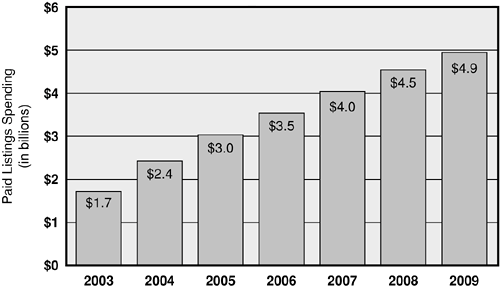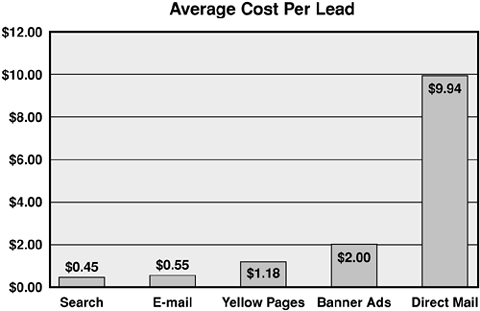| Now that you know a little bit about Web search, let's see why it should be part of your Web marketing mixthe advertising and other expenditures that your business allocates in its marketing budget. When we use the term marketing mix, we want you to think broadlybeyond what folks traditionally consider marketing. If your Web site is part of a for-profit business, then selling products is exactly what you do, but even nonprofit businesses have some kind of marketing mixa budget that is allocated in various ways to attract visitors to the site to do something. If it is not to buy a product, it might be to donate money, or vote for your candidate. Whatever your Web site's purpose, search marketing should be part of the budget for attracting visitors to your site. Your competitor's marketing mix might already include paid search; after all, the share of advertisers' budgets devoted to search marketing increases each year. Some businesses fund organic efforts from marketing budgets, too (whereas others use technology budgets for organic search). U.S. paid placement is expected to continue growing faster than any other sector of online advertising, at 17 percent a year, as it rises from an estimated $2.4 billion in 2004 to nearly $5 billion in 2009 (as shown in Figure 1-13). Figure 1-13. U.S. paid placement spending. Paid placement continues to grow, albeit more slowly than in years past. Source: JupiterMedia (July 2004) 
A BRIEF HISTORY OF WEB SEARCH Search technology predates the Web by more than 20 years; after all, computers were first used to catalog documents and retrieve them in the 1960s. But although search technology grew to handle databases of thousands and later millions of documents within large organizations, nothing prepared the search industry for the size of the Word Wide Web. For the first time, billions of documents could be included in a single search, and search technology was not initially up to the task. The first popular solution to this new Web search problem was not really a search engine at all. A small California company began to manually categorize every site on the Web in 1994, listing each site in a subject taxonomy that Web visitors could use to find what they were looking for. At first, it had no real search capabilityvisitors could merely find the desired subject and get to the home pages of sites about that subjectbut it was a popular way to find things on this new World Wide Web. Thus began the first Web directory, called Yahoo!. At the same time, true search solutions began to emerge. WebCrawler, Excite, Lycos, and others began examining each page of every Web site and allowing searchers to look for any word on any page. But no real leader emerged until late in 1995 when Digital Equipment launched the AltaVista search engine. AltaVista differed from the rest; it delivered strikingly more relevant results than its predecessors. For the first time, searchers could find what they were looking for in one or two searches, with the best results near the top of the list. Almost overnight, the Web world was abuzz with news of this magical new way to find Web sites. For more than a year, Web users argued over the relative merits of Yahoo! Directory versus AltaVista search, but in 1997 two new choices emerged. Ask Jeeves developed a question-answering interface that provided access to answers to hundreds of thousands of commonly asked questions, such as "How many inches are in a meter?" that no directory or search technology could handle. Goto.com also made its debut in 1997, offering a unique system for advertisers to bid against each other for every search word, with the highest bidder receiving the #1 ranking for his page. Goto.com (later renamed Overture) launched the paid search industry. But Web search changed forever in 1998 with the launch of Google. Google was able to find hundreds of millions (now billions) of pages on the Web while providing much better results than other search engines. Google eschewed the question answering of Ask Jeeves, instead improving on the search-oriented approach of AltaVista, and at first it had no directory or paid placement. But it workedsearchers were struck by how frequently Google seemed to find the exact right answer at the top of the list. Searchers soon abandoned AltaVista in droves for the new favorite. Google has continued to innovate, by introducing the first search toolbar for browsers, by steadfastly separating paid search results from organic on its results page, and through new paid search techniques. Google introduced the AdSense paid search program, which combines both bidding and the popularity of an advertisement to decide which one is #1. Yahoo!, which once used Google as the organic search that complemented its directory, has now made an about-face, acquiring several organic search companies to form a new organic Yahoo! Search (replacing Yahoo!'s use of Google) in 2004. Yahoo! acquired Overture (formerly Goto) for its paid search, rebranding it as Yahoo! Search Marketing Solutions in 2005. Google and Yahoo! are now the two largest competitors in the search market, but a little history shows how quickly that can change, as anyone associated with AltaVista can attest. |
 | But the rise of search marketing is not just a U.S. phenomenon; it is a worldwide trend. European marketers already spend 13 percent of their online ad budget on paid search and expect it to increase to 15 percent by 2005. The picture in Asia is also striking; for example, China's paid placement spending is expected to increase fivefold by 2006 and Japan's by 560 percent by 2008. Around the world, search marketing expenditures have grown dramatically in recent years. Let's look at why. |
Prospective Customers Use Search One of the most basic reasons to spend your scarce marketing budget on search is that searchers buy products: Of all searchers, 33 percent are shopping, and 41 percent of Web users use search to find Web sites to research a purchase. Lest you think that not enough people are online for search marketing to be worth your while, note that total Web users passed the 300 million mark worldwide in 2004. As simple as it sounds, your customers are on the Web, and they use search to buy. Your site must be found by these searchers who are ready to buy. Think about the new way that people purchase products. They no longer call your company to have you mail them a brochure. They "Google" your offering ("verizon wireless"). Or maybe they look for your competitor's ("sprint"). Or they search for its generic name ("cell phone service"). If your company's Web site is not listed in the first few search results for these searches, you're out! You are out of the customer's consideration setthe group of companies that will be considered for the customer's purchase. If you are not in the customer's consideration set, you have no chance to make the sale to that customer. Even if the goal of your Web is not online purchase, your customers must find you to learn about your offerings, download information, or find the location of a retail store. Searchers are far more qualified visitors to your site than someone who clicks a banner ad, for example, so attracting search visitors is just good business. The main reason to make search part of your marketing mix is that that's where your customers are, but there are other reasons. Search Marketing Is Cost-Effective Beyond your customers' use of search, the case for including search in your marketing mix is compelling for another reason: Search marketing expenditures are a good value. European marketers report that they pay approximately  2 (euros) each time a searcher clicks their paid listings, and 55 percent regard that cost as "relatively cheap." Seventy-six percent of marketers believe paid search is better than banner ads for achieving their business goals, and 80 percent of businesses surveyed are satisfied with the return on investment for search marketing expenditures35 percent are very satisfied. In fact, search marketing has the lowest cost per lead of any market method, as shown in Figure 1-14. 2 (euros) each time a searcher clicks their paid listings, and 55 percent regard that cost as "relatively cheap." Seventy-six percent of marketers believe paid search is better than banner ads for achieving their business goals, and 80 percent of businesses surveyed are satisfied with the return on investment for search marketing expenditures35 percent are very satisfied. In fact, search marketing has the lowest cost per lead of any market method, as shown in Figure 1-14. Figure 1-14. Comparing advertising value. Search is the leader in return on advertising investment. Source: Piper, Jaffray & Co. (March 2003) 
Why is this important? Because if you want to start spending money on search, you need to stop spending on something else. When you understand that search is the most effective way to spend your scarce marketing dollars, you should be able to easily make the tradeoffs required to reduce some existing budgets (direct mail, perhaps?) to find the money for your new search expenditures. Search Marketing Is Big Business You can tell a new marketing technique is taking off by noticing the number of consultants that hang out their shingles to help you do it! Several kinds of firms are involved in search marketing: Search consultants. A brand new kind of consultancy has sprung up in the past several years, variously known as SEO consultants or SEM consultants. These new firms, led by iProspect, Fathom Online, and Global Strategies International, handle search marketing and nothing else. Traditional advertising agencies. At the other end of the spectrum are the old-line advertising agencies that have been around for years. Just as firms such as Young & Rubicam and Ogilvy & Mather handle TV, radio, and print advertising, in recent years they have taken on Web advertising. Starting with banner ads, they have now moved into search marketing, too. Some ad agencies handle paid search only, whereas others offer SEO consulting for organic search, too. Interactive advertising agencies. In between the two extremes, interactive agencies handle anything online, ranging from search marketing to banner ads to e-mail campaigns. Sometimes these agencies are subsidiaries of the traditional ad agencies, such as OgilvyInteractive, whereas others, such as Avenue A | Razorfish, are smaller, independent firms.
All of these firms are competing for your growing interactive marketing budgetalmost 3 percent of all advertising spending in 2003. Your organization might already work with one of these companies, or might be looking for a search marketing partner. What is most important at this point is your interest in allocating part of your marketing budget to search, because you will soon see that achieving success is rather challenging. |

